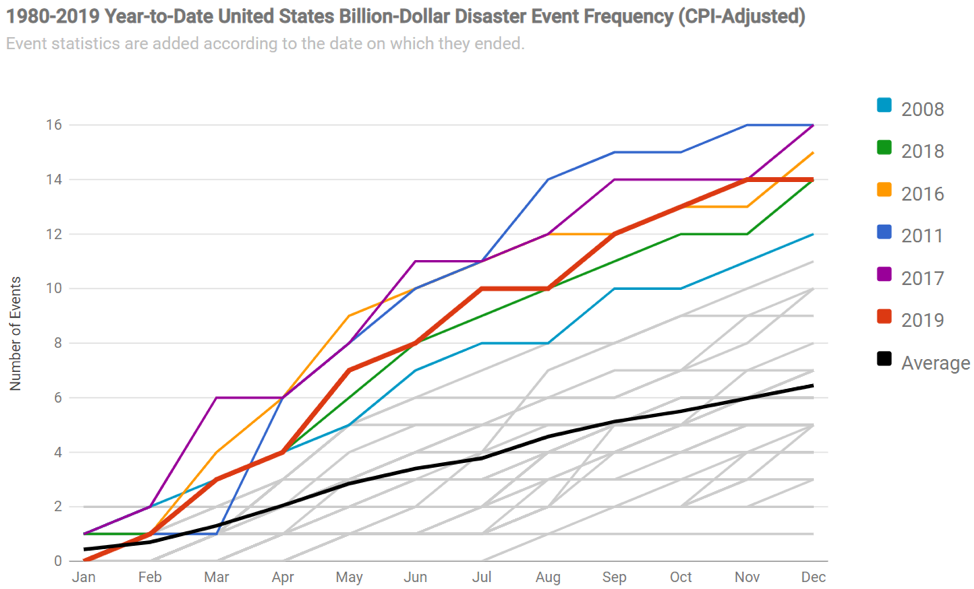
2010-2019: A landmark decade of U.S. billion-dollar weather and climate disasters
Author: Adam B. Smith
January 8, 2020
NOAA’s National Centers for Environmental Information (NCEI) tracks U.S. weather and climate events that have great economic and societal impacts (
www.ncdc.noaa.gov/billions). Since 1980, the U.S. has sustained 258* weather and climate disasters where the overall damage costs reached or exceeded $1 billion (including adjustments based on the Consumer Price Index, as of January 2020). The cumulative cost for these 258 events exceeds $1.75 trillion.
During 2019, the U.S. experienced a very active year of weather and climate disasters. In total, the U.S. was impacted by 14 separate billion-dollar disasters including: 3 major inland floods, 8 severe storms, 2 tropical cyclones (Dorian and Imelda), and 1 wildfire event. 2019 also marks the fifth consecutive year (2015-19) in which 10 or more separate billion-dollar disaster events have impacted the U.S.
Over the last several years costly disasters have been particularly destructive. The historic 2019 U.S. inland flooding across many Central states follows the historic 2018 and 2017 Atlantic hurricane and Western wildfire seasons, which set new damage cost records. These disasters have impacted dozens of Eastern, Central, and Western states, in addition to Caribbean territories (i.e., Puerto Rico and the U.S. Virgin Islands).
The number and cost of disasters are increasing over time due to a combination of increased exposure (i.e., values at risk of possible loss), vulnerability (i.e., how much damage does the intensity (wind speed, flood depth) at a location cause) and that climate change is increasing the frequency of some types of extremes that lead to billion-dollar disasters (NCA 2018, Chapter 2).
Number of events
The 14 separate U.S. billion-dollar disasters in 2019 represent the fourth highest total number of events (tied with 2018), following the years 2017 (16), 2011 (16) and 2016 (15). The most recent years of 2019, 2018 and 2017 have each produced more than a dozen billion-dollar disasters to impact the United States—totaling 44 events. This makes a 3-year average of 14.6 billion-dollar disaster events, well above the inflation-adjusted average of 6.5 events per year (1980-2019).
On a slightly longer timeframe, the U.S. has experienced 69 separate billion-dollar disaster events over the last 5 years (2015-2019), an inflation-adjusted average of 13.8 events per year. Over the last 40 years (1980-2019), the years with 10 or more separate billion-dollar disaster events include 1998, 2008, 2011-2012, and 2015-2019.
https://www.climate.gov/news-features/blogs/beyond-data/2010-2019-landmark-decade-us-billion-dollar-weather-and-climate